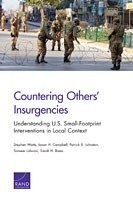| 来源类型 | Research Reports
|
| 规范类型 | 报告
|
| ISBN | 9780833084040
|
| 来源ID | RR-513-SRF
|
| Countering Others' Insurgencies: Understanding U.S. Small-Footprint Interventions in Local Context |
| Stephen Watts; Jason H. Campbell; Patrick B. Johnston; Sameer Lalwani; Sarah H. Bana
|
| 发表日期 | 2014
|
| 出版年 | 2014
|
| 页码 | 250
|
| 语种 | 英语
|
| 结论 |
Counterinsurgency is perhaps the most context-dependent activity in which militaries engage — U.S. "small-footprint" interventions have typically succeeded in highly favorable conditions, where few of the insurgencies occur.- "Success stories" in small-footprint U.S. interventions on behalf of partner governments have occurred in countries with relatively inclusive politics and reasonable levels of state capacity.
- Most insurgencies target governments that are weak in inclusion and in capacity. Such regimes gravitate toward counterinsurgency practices relying on blunt, abusive military force.
- The United States should seldom expect a productive counterinsurgency partnership with a regime whose character must be transformed to achieve a favorable outcome.
Nevertheless, the United States can support difficult partner regimes in exploiting settlement opportunities, improving security force accountability, and buttressing more inclusive successor governments.- Given the duration of most contemporary insurgencies and the length of time it typically takes to build state capacity or institutionalize mechanisms of political inclusion, most U.S. partnerships in such contexts will be long-term.
- The United States can help partner regimes credibly commit to political compromises with reconcilable elements of the armed opposition through a variety of instruments, potentially including large-scale commitments of foreign aid and, in some contexts, international peace operations.
- Security forces that do not include members of the same ethnic or religious affiliation as the population in which they are operating are at particularly high risk of abusive behavior.
|
| 摘要 |
- U.S. efforts to reform partner nations should focus on finding areas of agreement, potentially helping to convene the networks of actors in the partner nation that can implement changes, and then providing the necessary resources and technical expertise.
- The United States should stress quality over quantity in developing partners' security forces.
- Wherever possible, partner-nation units receiving such assistance should be closely paired with U.S. forces to ensure that the United States has visibility into how its assistance is being used.
- The United States should make the principle of civilian oversight and other accountability mechanisms central to its security-sector assistance.
- Because security forces that do not include members of the same ethnic or religious affiliation as the population in which they are operating are at particularly high risk of abusive behavior, the United States should work with partner regimes to improve the representativeness of their security services.
- Security-sector reform efforts should be a central element of U.S. "phase-zero," or peacetime, engagement strategy, not a peripheral concern or an issue to which significant resources are devoted only after a crisis erupts.
|
| 主题 | Global Security
; Military Strategy
; Pakistan
; Peacekeeping and Stability Operations
; Philippines
|
| URL | https://www.rand.org/pubs/research_reports/RR513.html
|
| 来源智库 | RAND Corporation (United States)
|
| 资源类型 | 智库出版物
|
| 条目标识符 | http://119.78.100.153/handle/2XGU8XDN/107813
|
推荐引用方式
GB/T 7714 |
Stephen Watts,Jason H. Campbell,Patrick B. Johnston,et al. Countering Others' Insurgencies: Understanding U.S. Small-Footprint Interventions in Local Context. 2014.
|
|
文件名:
|
x1495316363878.jpg
|
|
格式:
|
JPEG
|

|
文件名:
|
RAND_RR513.pdf
|
|
格式:
|
Adobe PDF
|
除非特别说明,本系统中所有内容都受版权保护,并保留所有权利。